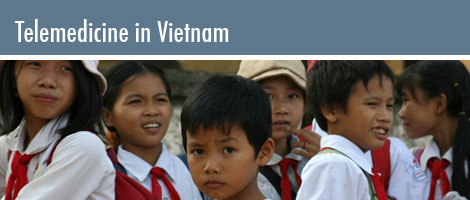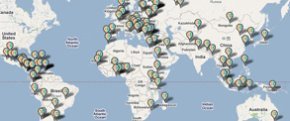Telemedicine in Asia

“Making a difference in pediatric cardiac care, one day at a time”
Challenge
There are 4.5 billion people in the world today who have no access to cardiac surgery because they lack funding and capacity. In Vietnam, for instance, 1 out of 100 children are born with congenital heart defects. And a poor family, living on less than a dollar a day cannot afford to pay for medical care or nor they afford the means to travel to transport a sick child to the doctor.
At the same time today, in many developing countries, there are not enough cardiac surgeons trained in the latest surgical techniques, in particular for infants, newborns, and other complicated cases. To address this issue, VinaCapital Foundation, in collaboration with the World Heart Foundation and the World Bank’s Development Learning Network in Hanoi, Vietnam, has been sponsoring a training series that brings together local doctors with leading experts in the field of cardio-thoracic surgery.
Approach
The regional training series, called “The International Symposium for cardiac Care Teleconference Series”, consist of videoconference sessions linking the world’s best in cardio-thoracic surgery, cardiology, and pediatric cardiac care with surgeons and doctors throughout specialized in cardiac care throughout Asia.
The goal of the program is, on the one hand, to improve capacity for cardiac care and cardiac surgery in Vietnam and in other Asian countries but also, on the other hand, to increase access and outcomes for children with heart disease, through medical training. While learning centers in Indonesia, Cambodia, China, and Bangladesh are also connected—thereby allowing their doctors to participate interactively– doctors from all over Vietnam have been gathering in the GDLN centers in Ho Chi Minh City and Hanoi to learn more from leaders in this field.
Results
Since the program was first launched in November 2008, more than a dozen topics in cardiac care have been covered during the series. It is estimated that more than 700 doctors from Vietnam, Cambodia, Bangladesh, Indonesia, and China have participated in several of them. Some have joined in via webcast.
“Many participants have attended multiple sessions…. there are more cardiologists than there are surgeons so we webcast to allow more people to attend the lectures”, says Robin Austin, the Executive Director of VinaCapital Foundations.
In fact one great aspect of the lectures is the fact that they are interactive, allowing participants to ask questions after each presentation. The lecturers themselves come from institutions such as Emory University School of Medicine, Cleveland Clinic, and the Children’s Heart Institute in Washington, DC.
One participant, Dr. Thanh, from the Viet Duc Hospital in Hanoi, who attended several sessions comments “this program is a really valuable opportunity for us. We are learning from experts who have helped update our knowledge of techniques as well as methodologies when doing scientific researches and giving lectures. Last year, for example, our ward conducted operations for more than 1400 patients, among those, 750 cases were performed with the assistance of machines, which this training program has covered.”
Commenting on the success of the series, Mrs. Austin adds “…in every single session, we see an increase in the number of participants. We are beginning to have a space issue.”
The most recent session took place on September 10, 2009, death with the subject of “Ebsteinis Anomaly and Diagnosis and Treatment” with Doctor Joseph A Dearani, MD of the Mayo Clinic in Rochester, New York. 150 cardiac surgeons participated in a three-hour live lecture. Participating cities and countries included Danang, Hanoi, Hue, and Ho Chi Minh City (Vietnam); Jakarta (Indonesia); Beijing (China); Phnom Penh (Cambodia); Dhaka (Bangladesh); and various cities across India, New Zealand, Pakistan, Philippines, and Sri Lanka via webcast.
Through the GDLN’s network of centers, recorded and interactive learning binders have been developed in multiple languages for distribution by the Foundation to medical programs and libraries in developing nations. As Dr. Thanh puts it, “nowadays, telemedicine is becoming more and more popular. It enables more people to participate in and this program is a good way for participants to improve their English skills.”
The evaluate the success of the training program, beyond the knowledge shared between surgeons, one direct beneficiary, Mr. Dzung, the father of seven month-old baby said it best when his son was operated by Dr. Thanh. “My son was diagnosed with ventricular defects and was moved to the hospital to get operation two days ago,…he had quick recovery and I hope to take him home in about one week. Most people stay more than that.”
In December 2008, the program was accepted as a “Clinton Global Initiative” and praised by former President Clinton as a model health program during the Clinton Global Initiative meeting in Hong Kong.
- Add new comment

- 6032 reads
- Français
- Español
